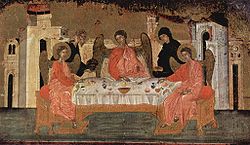Hospitality
This article needs additional citations for verification. (January 2011) |
Hospitality is the relationship between guest and host, or the act or practice of being hospitable. Specifically, this includes the reception and entertainment of guests, visitors, or strangers, resorts, membership clubs, conventions, attractions, special events, and other services for travelers and tourists.
Etymology
The word hospitality derives from the Latin hospes, which is formed from hostis, which originally meant "to have power." The meaning of "host" can be literally read as "lord of strangers."[1] Hostire means "equalize or compensate."
Contemporary usage
In the contemporary West, hospitality is rarely a matter of protection and survival, and is more associated with etiquette and entertainment. However, it still involves showing respect for one's guests, providing for their needs, and treating them as equals. Cultures and subcultures vary in the extent to which one is expected to show hospitality to strangers, as opposed to personal friends or members of one's in-group.
The hospitality service industry includes hotels, casinos, and resorts, which offer comfort and guidance to strangers, whether it be commercial (for monetery gain) or non-commercial (not for profit). The terms hospital, hospice, and hostel also derive from "hospitality," and these institutions preserve more of the connotation of personal care.
Hospitality ethics is a discipline that studies this usage of hospitality.
Global concepts
Pakhtuns
The Pakhtun people of South-Central Asia, pre-dominant in the Khyber Pakhtunkhwa province of Pakistan and Afghanistan have a strong code of hospitality. They are a people characterized by their use of Pakhtunwali, an ancient set of ethics, the first principle of which is Milmastiya or Hospitality. The general area of Pakhtunistan is also nicknamed The Land of Hospitality.
Biblical and Middle Eastern

In Middle Eastern Culture, it was considered a cultural norm to take care of the strangers and foreigners living among you. These norms are reflected in many Biblical commands and examples.[2]
The obligations of both host and guest are stern. The bond is formed by eating salt under the roof, and is so strict that an Arab story tells of a thief who tasted something to see if it was sugar, and on realizing it was salt, put back all that he had taken and left.
Classical World
To the ancient Greeks and Romans, hospitality was a divine right. The host was expected to make sure the needs of his guests were seen to. The ancient Greek term xenia, or theoxenia when a god was involved, expressed this ritualized guest-friendship relation.
Celtic cultures
Celtic societies also valued the concept of hospitality, especially in terms of protection. A host who granted a person's request for refuge was expected not only to provide food and shelter to his/her guest, but to make sure they did not come to harm while under their care.[3]
India
In India, hospitality is based on the principle Atithi Devo Bhava, meaning "the guest is God." This principle is shown in a number of stories where a guest is literally a god who rewards the provider of hospitality. From this stems the Indian approach of graciousness towards guests at home, and in all social situations.
Cultural value or norm
Hospitality as a cultural norm or value is an established sociological phenomenon that people study and write papers about (see references, and Hospitality ethics). Some regions have become stereotyped as exhibiting a particular style of hospitality. Examples include:
See also
- Backpacking (travel)
- CouchSurfing
- Hospitality Club
- Hospitality management studies
- Hospitality services, modern day hospitality networks.
- Hotel manager
- International School of Business Management Switzerland
- Motel
References
This article includes a list of general references, but it lacks sufficient corresponding inline citations. (February 2008) |
- ^ [1]
- ^ Exodus 22:21, NIV
- ^ Charles MacKinnon, Scottish Highlanders (1984, Barnes & Noble Books); page 76
Further reading
- Christine Jaszay (2006). Ethical Decision-Making in the Hospitality Industry
- Karen Lieberman & Bruce Nissen (2006). Ethics in the Hospitality And Tourism Industry
- Rosaleen Duffy and Mick Smith. The Ethics of Tourism Development
- Conrad Lashley and Alison Morrison. In Search of Hospitality
- Hospitality: A Social Lens by Conrad Lashley and Alison Morrison
- The Great Good Place by Ray Oldenburg
- Customer Service and the Luxury Guest by Paul Ruffino
- Fustel De Coulanges. The Ancient City: Religion, Laws, and Institutions of Greece and Rome
- Bolchazy. Hospitality in Antiquity: Livy's Concept of Its Humanizing Force
- Jacques Derrida (2000). Of Hospitality. Trans. Rachel Bowlby. Stanford: Stanford University Press.
- Steve Reece (1993). The Stranger's Welcome: Oral Theory and the Aesthetics of the Homeric Hospitality Scene. Ann Arbor: The University of Michigan Press.
- Mireille Rosello (2001). Postcolonial Hospitality. The Immigrant as Guest. Standford, CA: Stanford University Press.
- Clifford J. Routes (1999). Travel and Translation in the Late Twentieth Century. Cambridge, MA: Harvard University Press.
- John B. Switzer (2007). "Hospitality" in Encyclopedia of Love in World Religions. Santa Barbara, CA: ABC-CLIO.
- Immanuel Velikovsky (1982). Mankind in Amnesia. Garden City, New York: Doubleday.
